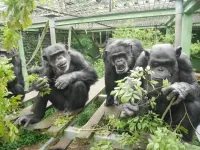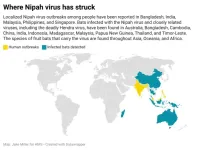(Press-News.org) A new study reported in the Cell Press journal Current Biology on January 20 is the first to describe a phenomenon researchers refer to as “contagious urinations.” The study in 20 captive chimpanzees living at the Kumamoto Sanctuary in Japan shows that, when one chimp pees, others are more likely to follow.
“In humans, urinating together can be seen as a social phenomenon,” says Ena Onishi of Kyoto University.
“An Italian proverb states, ‘Whoever doesn’t pee in company is either a thief or a spy’ (Chi non piscia in compagnia o è un ladro o è una spia), while in Japanese, the act of urinating with others is referred to as ‘Tsureshon’ (連れション). This behavior is represented in art across centuries and cultures and continues to appear in modern social contexts. Our research suggests that this phenomenon may have deep evolutionary roots. We found that chimpanzees, our closest relatives, tend to urinate in response to the urination of nearby individuals.”
The researchers decided to study this behavior after noticing that the sanctuary chimpanzees seemed to pee at about the same time. It reminded them of human behavior, and they wondered whether it might be comparable to contagious yawning. To find out, they documented peeing behaviors in the Kumamoto chimpanzees over more than 600 hours, including 1,328 urination events. They analyzed the observational data to see whether peeing among the chimpanzees was significantly synchronized in time. They also explored whether it was influenced by nearby individuals or shaped by social factors.
The evidence showed that urination events were significantly more synchronized during observations than would be expected if the chimpanzees were simply peeing at random times with respect to one another. The likelihood of contagious urination also increased with physical proximity to the initial urinator, they report. Interestingly, individuals with lower dominance ranks were more likely to pee when others were peeing. The finding suggests that urination patterns are influenced by social hierarchy, with a tendency for the behavior to "flow down" the dominance structure, the researchers say.
“We were surprised to discover that the contagion pattern was influenced by social rank,” Onishi says. “Since there were no prior studies on contagious urination in any species, we drew parallels to contagious yawning, another semi-voluntary physiological behavior. Based on this, we initially expected that any social influences might resemble those seen in yawning—such as stronger contagion between socially close pairs. However, our results showed no evidence of effects related to social closeness. Instead, we observed a clear influence of social rank, with lower-ranking individuals being more likely to follow the urination of others.”
“This was an unexpected and fascinating result, as it opens up multiple possibilities for interpretation,” Shinya Yamamoto, also of Kyoto University, adds. “For instance, it could reflect hidden leadership in synchronizing group activities, the reinforcement of social bonds, or attention bias among lower-ranking individuals. These findings raise intriguing questions about the social functions of this behavior.”
The findings may have important implications for understanding and exploring the role of this behavior in maintaining group cohesion, facilitating coordination, or reinforcing social bonds within the group, according to the researchers. It reveals how this seemingly mundane and necessary behavior might be of overlooked social significance.
The researchers say more study is needed to understand the specific functions and mechanisms underlying contagious urination in chimpanzees. They’re also curious to know whether this phenomenon exists in other species.
###
Current Biology, Onishi et al.: “Contagious urination in chimpanzees.” https://www.cell.com/current-biology/fulltext/S0960-9822(24)01594-X
Current Biology (@CurrentBiology), published by Cell Press, is a bimonthly journal that features papers across all areas of biology. Current Biology strives to foster communication across fields of biology, both by publishing important findings of general interest and through highly accessible front matter for non-specialists. Visit http://www.cell.com/current-biology. To receive Cell Press media alerts, contact press@cell.com.
END
Scientists at Harvard Medical School and Boston University Chobanian & Avedisian School of Medicine have mapped a critical component of the Nipah virus, a highly lethal bat-borne pathogen that has caused outbreaks in humans almost every year since it was identified in 1999.
The advance, described Jan. 20 in Cell, brings scientists a step closer to developing much-needed medicines. Currently, there are no vaccines to prevent or mitigate infection with the Nipah virus and no effective treatments for the disease ...
Demand for weight-loss medications sold under brand names such as Ozempic and Wegovy continues to surge, with a recent study reporting one in eight Americans has taken or is currently using the drugs to treat diabetes, heart disease or obesity.
Formally, these drugs are known as glucagon-like peptide-1 receptor agonists (GLP-1RA) and include Mounjaro and Zepbound. Informally, media, patients and even some physicians have dubbed GLP-1 medications as “miracle drugs” because of the profound weight loss among users. While these health benefits are well established, information is sparse on the drugs’ effects across ...
Over half of our genomes consists of thousands of remnants of ancient viral DNA, known as transposable elements, which are widespread across the tree of life. Once dismissed as the "dark side" of the genome, researchers at Helmholtz Munich and Ludwig-Maximilians-Universität (LMU) have now revealed their crucial role in early embryo development.
Unanswered Questions About the Role of Ancient Viral DNA
Transposable elements, remnants of ancient viral DNA, are reactivated during the first hours and days following fertilization. ...
Researchers at Karolinska Institutet and the Astrid Lindgren Children’s Hospital in Sweden have determined how children’s immune systems react to different kinds of cancer depending on their age. The study, which is published in the journal Cell, reveals significant differences between the immune response of children and adults, and has the potential to lead to new tailored treatments for children with cancer.
“The activation of the immune system is crucial to our ability to fight cancer, but differs between children and adults,” says Petter Brodin, professor of paediatric immunology at the ...
Background and objectives
Waist circumference (WC) is closely associated with metabolic diseases, including diabetes mellitus (DM), metabolic syndrome, and mortality. However, the correlation between WC and mortality varies across populations and has rarely been examined specifically in patients with DM. In this study, we explored the relationships between WC and both all-cause and cardiovascular mortalities among individuals with DM.
Methods
Participants from the National Health and Nutrition Examination Survey 2003–2018 included 3,151 women and 3,473 men with DM who had baseline WC measurements. Survival data were collected from enrollment until December 31, 2019. ...
Archaeologists have uncovered a rare Tetrarchic boundary stone at the site of Abel Beth Maacah in northern Israel. Originally marking land borders under Roman Emperor Diocletian’s tax reforms, the stone provides insight into ancient land ownership, local settlement patterns, and imperial administrative practices. The discovery also introduces two previously unknown place names, expanding our understanding of the region’s historical geography and socio-economic landscape.
Archaeologists Prof. Naama Yahalom-Mack and Dr. Nava Panitz-Cohen from the Institute of Archaeology at the Hebrew University, and Prof. Robert Mullins from Azusa Pacific University have uncovered a significant ...
A global survey spanning 68 countries reveals that public trust in scientists is still high. Led by the University of Zurich and ETH Zurich, a team of 241 researchers conducted the largest post-pandemic study of trust in science, societal expectations and public views on research priorities.
Trust in scientists is at a moderately high level worldwide, according to a new study. This is the conclusion of an international team of 241 researchers led by Viktoria Cologna of ETH Zurich and Niels G. Mede of the University of Zurich (UZH). “Our results show that most people in most countries have a relatively ...
A new international study on public trust in science, conducted across 68 countries, has found that most people trust scientists and believe they should be more involved in society and policymaking. Further, a majority of survey participants believe that scientists should be more involved in society and policymaking.
Published in Nature Human Behaviours (pre print link), this research was conducted by TISP, a Harvard University-based consortium led by Dr Viktoria Cologna (Harvard University, RTH Zurich) and Dr Niels G Mede (University of Zurich), which includes 241 researchers from 169 institutions worldwide, including the University of Bath.
The study, which includes 71,922 respondents—2,008 ...
People with the skin condition psoriasis often have invisible inflammation in the small intestine with an increased propensity for ‘leaky gut’, according to new research at Uppsala University. These changes in the gut could explain why psoriasis sufferers often have gastrointestinal problems and are more prone to developing Crohn’s disease. The study is published in Biochimica et Biophysica Acta (BBA) – Molecular Basis of Disease.
Psoriasis is a hereditary, chronic skin condition that can also result in inflammation of the joints. In Sweden, almost 300,000 people live with some form of the condition. Chronic inflammatory bowel ...
A new review on zoonotic infections — diseases transmitted by animals — in the Canadian Arctic provides timely guidance to clinicians as the region experiences heightened global interest as well as climate change, which threatens the region and increases risk of disease transmission. The review, published in CMAJ (Canadian Medical Association Journal) https://www.cmaj.ca/lookup/doi/10.1503/cmaj.240541, provides guidance on how to identify and manage seven zoonotic infections in people.
“Indigenous Peoples continue to be caretakers of ...




